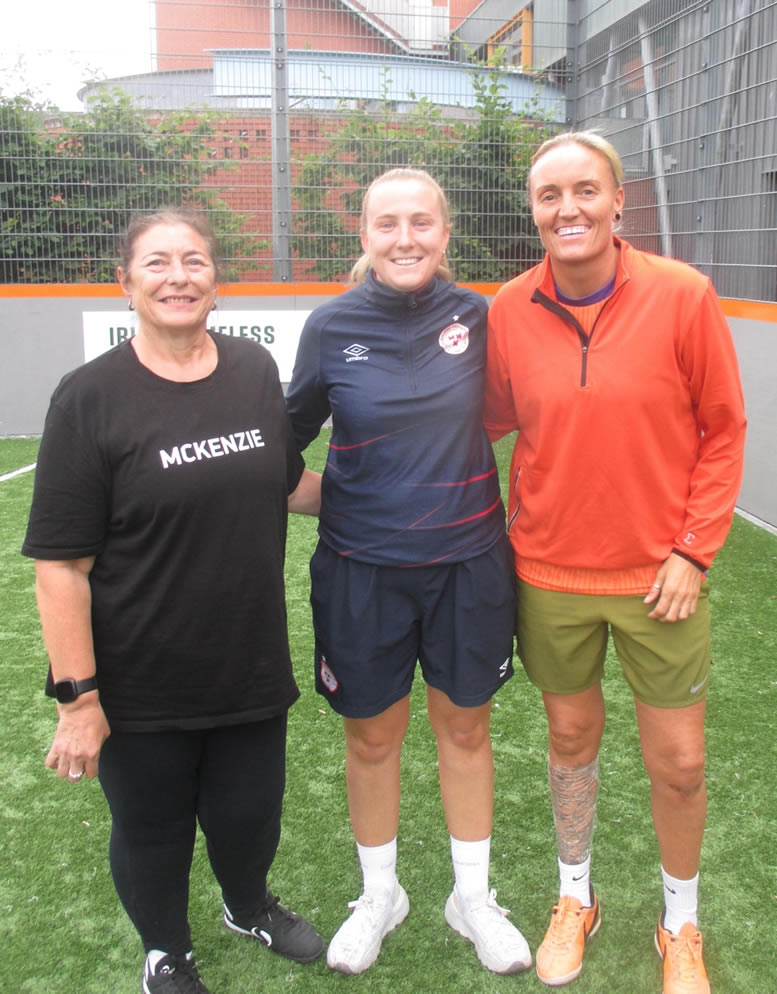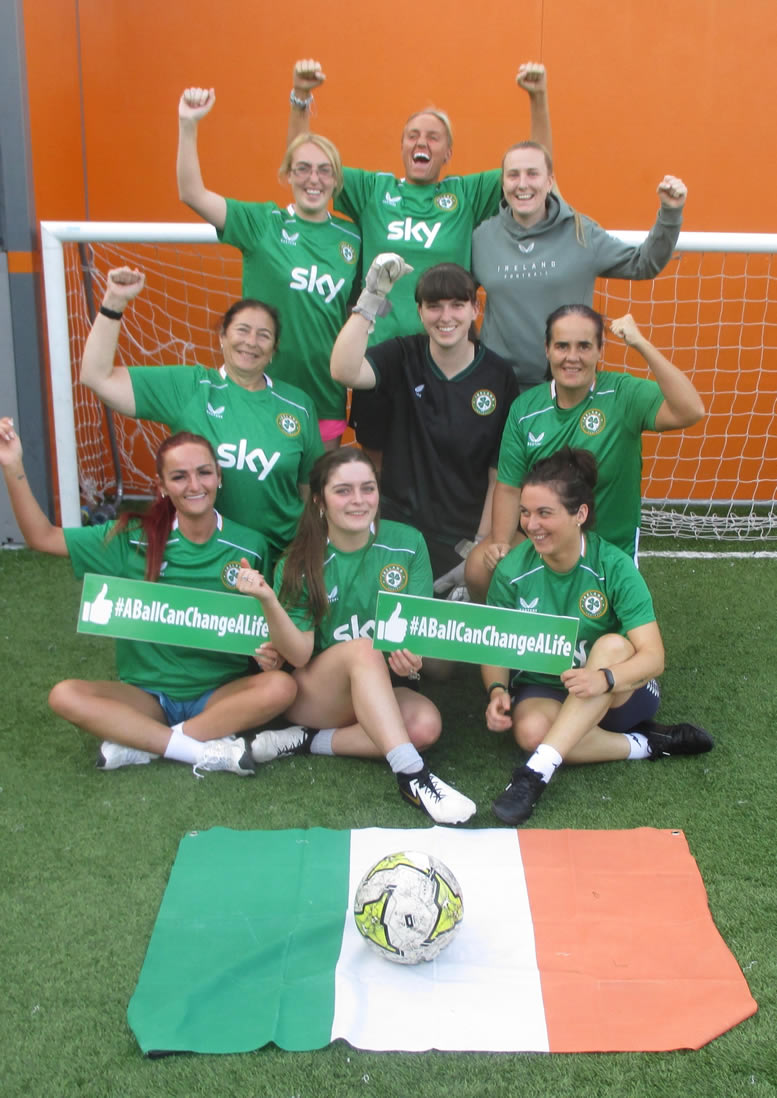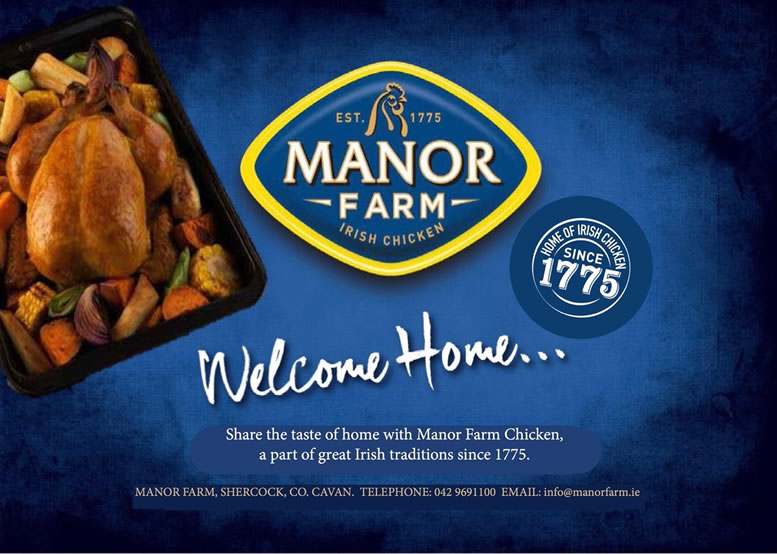Representing Ireland is a dream come true for these Ireland’s ladies who have proven their resilience in the face of many life traumas Jennifer May reports.
In May of this year the number of people experiencing homelessness in Ireland reached an all-time high, with over 15,747 (nearly 5,000 of whom are children) on the homeless register. For people who may be experiencing homelessness, issues of problematic substance use, poor mental health, and long-term unemployment, the road back to perceived ‘normality’ is becoming even more difficult, as support agencies struggle to provide resources to assist people on the road to recovery.
Despite the constant struggle for adequate funding, is the Irish Homeless Street Leagues (IHSL) has constantly proved to have positive outcomes. Using the power of football to bring about lasting change for marginalized individuals, it cannot be stressed enough that this initiative is about so much more than a game, and since its inauguration in 2003, it has acted as a catalyst in empowering individuals to take responsibility, control and rebuild their lives.
‘I experienced homelessness as a child, going through emergency accommodation and refuges,’
The ladies’ team has been going from strength-to-strength and last year at the Homeless World Cup in South Korea, they won the Trophy Stage of the competition. Two years ago in the US, under the management of coach Mary Byrne, they narrowly missed winning, losing out to Chile in the semi-finals. There have been other accolades won under her tutelage and she understands more than most the struggles that players face, having experienced homelessness as a young child.
‘I experienced homelessness as a child, going through emergency accommodation and refuges,’ remembers Mary. ‘My dad would have struggled with alcohol but gave up drinking before I was born, but I was always remembered that, growing up.’
Mary was not fond of school, finding football as a positive outlet where she could forget her troubles. Doing a number of football courses and playing for her local club she later joined the street leagues as Player/coach
‘Graham Tucker, the men’s Street leagues coordinator in Pearse street was my role model down there,’ smiles Mary. ‘We played up North in the Nations Cup and I got Player of the Tournament, and in Denmark in 2019, we came second in the Global Goals tournament.’ It was these wins that made Mary determined to stay involved and having achieved her coaching badges she is now the Street Leagues International ladies coach she uses that resilience and focus to good effect in training the girls that are set to represent Ireland in Oslo. ‘it’s hard for them at the start as they need to understand their roles within the team as tactically it’s a new way of playing explains Mary. ‘But they learn pretty quickly, and they take the hard work and training very seriously.’
This year’s team is a wide mix of ages and experiences, but all are dedicated to the league and to doing their up-most to represent Ireland with skill and pride. ‘I was rapidly becoming someone I swore I would never be,’
Dionne Lyons is a healthy, athletic-looking forty-two-year-old. Originally from the Oliver Bond flats in Dublin City Centre, she remembers a great up-bringing within a very close-knit community. ‘I was also a very keen footballer and played football from the age of seven,’ smiles Dionne. ’I also played for St Catherine’s when I was young.’
Her family all worked hard and even as a youngster Dionne was always resourceful, always anxious to work. ‘ I came from a family of street traders on my father side, she says. ‘Since I was a little kid I was always selling something,’ she laughs, ‘I was a real little Del Boy.’
When she left school, there were numerous jobs, before Dionne got a job in Irish Distillers making whisky– she also worked for Bailey’s and in Event Management. While these were great jobs there was also drug use – a lot of cocaine and Dionne eventually found her life spiraling out of control. By the time she was in her late thirties she found her drug use was taking control over her life and decisions. ‘I was rapidly becoming someone I swore I would never be,’ she says.
As drugs became her main focus, her decision-making suffered and a series of these poor choices led her to being incarcerated in Styal Prison in Manchester. ‘I was travelling to Britain and met this guy on the journey. I made the stupid decision to use cocaine with him and by the time we were in England we wanted more, so went to score. ‘We ended up arrested (on a trumped-up dwelling -burglary charge which was eventually vacated completely) and held on remand for 2.5 months with no phone call, no finger-printing, and no-one knowing where I was.’
HMP Styal Prison is no picnic and at one time had the reputation as having one of the worst records for suicide of any prison in England and Wales. In 2021, due to the death of a baby born to an inmate the prison was placed under investigation by the Prisons and Probation Ombudsman. While this would have been exceptionally traumatic, terrifying environment for most people to be held almost incognito, Dionne believes this was the turning point for her in her addiction. ‘Landing in Styal was the best thing that ever happened to me,’ she says, holding no resentment towards her time spent illegally locked up.
Family has always been her strength, ‘My mother was and is still my rock, she has never given up on me through everything,’ she says. Having received ongoing support from family and friends while still in prison, when she got back to Ireland, Dionne entered a residential treatment centre, before engaging with Soilse, where she was further helped through her recovery.
‘I met a lot of really brilliant people,’ she smiles, ‘my aunty said that her prayers had been answered.’ This engagement eventually led Dionne back to football and to the street leagues, and ultimately, to being picked for the World Cup Team. She remains modest about her achievements, and shies away from any praise. ‘Look, if my story helps one person, then I’m happy to share,’ she grins.
The girl’s team are every bit as talented and driven as the boys and they have proven their resilience in the face of many life traumas,’ says Sean Kavanagh, Street League founder and Chairman. ‘They have all overcome many obstacles to be here. With the support of our coaches they are empowered to start believing in themselves and this can pay massive dividends, both on the pitch and off.’
An incident in her early childhood and the accompanying trauma, led Fiona Taaffe to start using substances at a young age. Despite becoming a keen runner during her recovery journey, at 57, Fiona cannot believe she is fit enough to be representing Ireland in the Homeless World Cup. ‘This is such a huge opportunity I’ve been given,’ she says. ‘When I was first offered this chance to play in the street leagues, I thought, ‘’what, are you mad?’’, but I gave myself a talking to and three weeks ago I was shocked to be picked for the squad.’
Fiona says that she realises now that she has been in addiction all her life. Hailing from Coolock she was from a big family, three sisters and two brothers. ‘My parents did a great job’, she says. However, an incident in her early childhood and the accompanying trauma, led her to start using substances at a young age. ‘I was trying to block it out,’ she explains. ‘I was also constantly seeking care and attention, was constantly in hospital, because I felt a comfort there.’ Fiona admits that she went through numerous unnecessary procedures in her youth, mostly due to this desire for comfort and security that she felt surrounded by medical professionals.
Her first job was in a bakery and the unsocial hours led her to drinking in early houses, ‘We’d be in the pub by 8am and drunk by 2pm,’ she says. Her first child was born when she was twenty, and her parents stepped into the parental role as they recognized Fiona was not ready or able to take on the responsibility of a child. By the time she got her own home, the substance use and partying became something altogether darker. ‘I was drinking with some serious people and my house was constantly being raided by police. I was using heroin and crack, using my body for drugs, my daughter saw some things that were toxic for her, both physically and mentally’ she says. ‘At that time, I felt like she was getting in the way of my addiction, that’s how selfish I was. I hit rock bottom, then went lower.’
Six years ago after a family intervention Fiona went into treatment doing a five month stint in Cuan Mhuire in Bruree, Co Limerick. This was the beginning of her long hard road to recovery. While it was difficult, the support of her family was the constant she needed to turn her life around. ‘My children have been a wonderful support and my parents took me in when I was homeless,’ she smiles. She has her own apartment now, close to her daughter, works, and views the Homeless World Cup as just another chance she has been given. ‘This is such a great opportunity’ she says. ‘I was doubtful but my kids are so proud and my mother is always telling me how proud she is of me.’
‘You can see the players evolving and changing as they grow in confidence,’ reiterates Mary. ‘Its great and all based on their attitude.’ While she would love to see either team bring the trophy home for Ireland, that is not the driving force. ‘We’d all love to see them win,’ she laughs, ‘but for us its 100% about the taking part, being prepared and being the best we can be, we’ll give it our all and regardless of the outcome, that’ll be a result for us. Sounds like they’ve already hit the gold, regardless of what happens in Norway!
Congratulations and Best wishes to Ireland in the Homeless World Cup in Oslo, 2025



Sites linking to this page have chosen to adopt this Privacy Policy as their own. This means: they agree to abide by the principles laid out below.
In common with other websites, log files are stored on the web server saving details such as the visitor's IP address, browser type, referring page and time of visit.
Cookies may be used to remember visitor preferences when interacting with the website. Where registration is required, the visitor's email and a username will be stored on the server.
The information is used to enhance the visitor's experience when using the website to display personalised content and possibly advertising.
Email addresses will not be sold, rented or leased to 3rd parties. Email may be sent to inform you of news of our services or offers by us or our affiliates.
If you have subscribed to one of our services, you may unsubscribe by following the instructions which were included in the email that you received.
You can block cookies via your browser settings but this may prevent you from accessing certain features of the website.
Cookies are small digital signature files that are stored by your web browser that allow your preferences to be recorded when visiting the website. Cookies are used by most websites to record visitor preferences. Also they may be used to track your return visits to the website.
Like all sites, we use 3rd party tools to help us run the website. They are used not to track you but to track info like the visitors numbers on the site over a given period, to allow you to interact with the social-media widget and to allow us to login into this web based CMS (Content Management System).